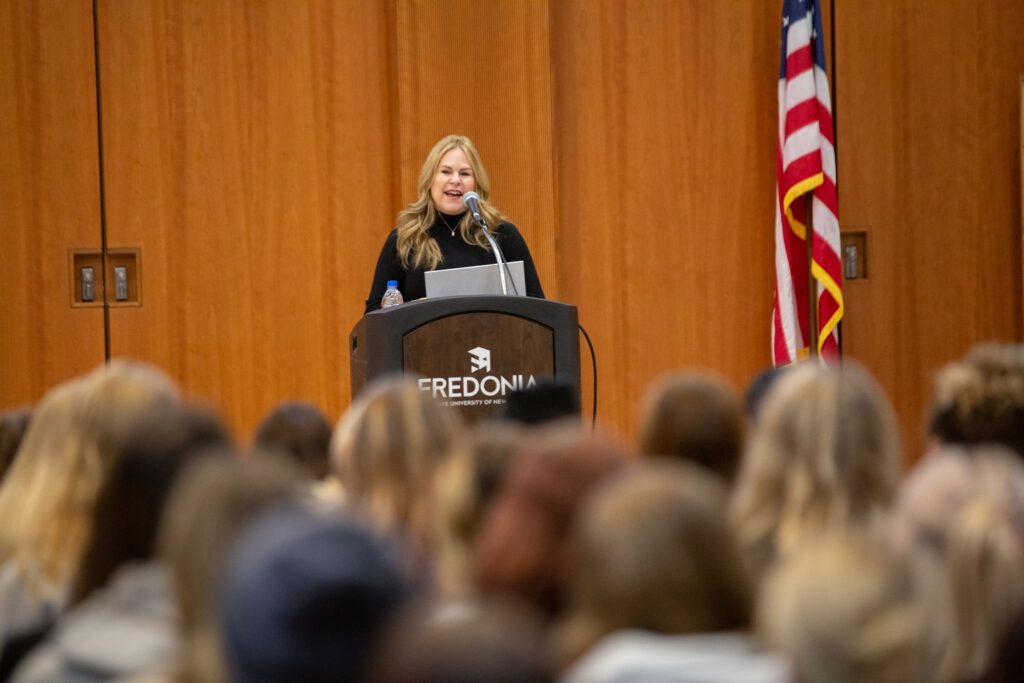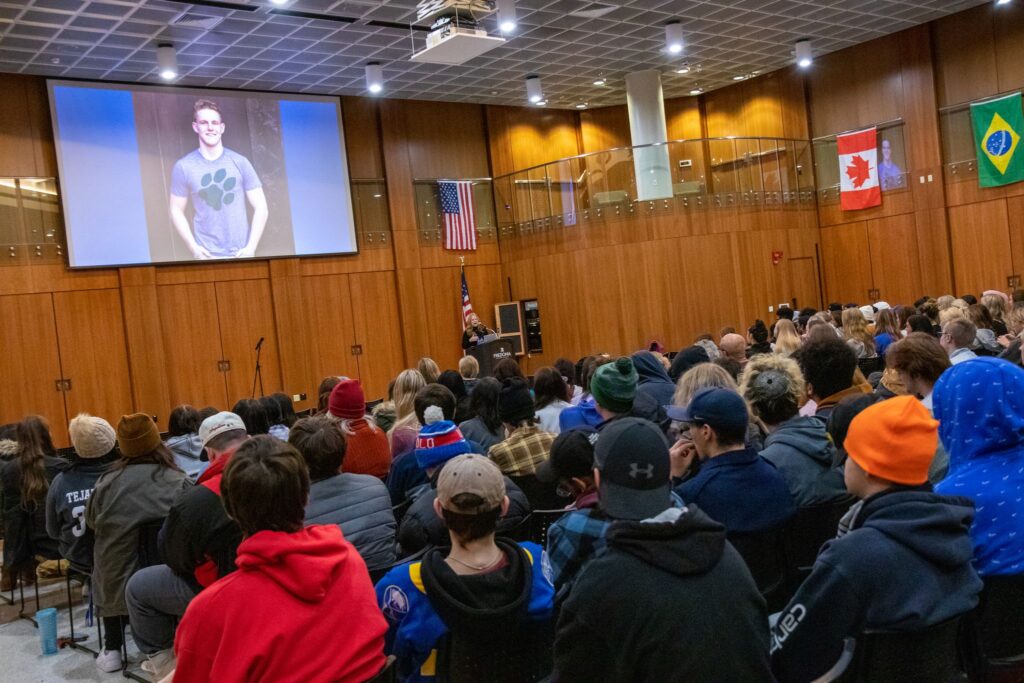ABIGAIL MILLER
Assistant News Editor
Hazing can occur anywhere. People see it on the news, hear about it through a friend or even witness it firsthand. Kathleen Wiant, the mother of a hazing victim, knows this all too well.
On Nov. 15, Kathleen Wiant gave a presentation at SUNY Fredonia about the dangers of hazing, the forms it occurs in and what can be done to stop it.
Kathleen lost her 18-year-old son Collin Wiant in November 2018 to a hazing incident in which he inhaled nitrous oxide as a part of an Ohio University fraternity’s pledging process.

Following the tragic event, Kathleen Wiant decided that it was her mission to prevent accidents like it from repeating. She has dedicated her life to educating students at universities across the country, as well as promoting legislative change both nationally and in the form of Collin’s Law against hazing in Ohio.
Wiant said Collin’s passing “motivated me to learn about hazing, which led to speaking and teaching others about [it].”
She is also a board member of the Collin Wiant Foundation, whose mission is to “bring more kindness and courage to the world.”
This was the second presentation Wiant has given at SUNY Fredonia, with the first having taken place in February of 2020, where she was nominated by several students to do her own TED Talk.
During November’s presentation, Wiant disclosed that hazing is most prevalent in athletic teams. Seventy-four percent of students that experience hazing belong to varsity athletics, and 73% of students that experience hazing are involved in Greek life. Students who are not members of athletic teams or fraternities and sororities are also affected by hazing. More than half of students who have been hazed belong to performing arts clubs or club sports, and over a fifth of students who have been hazed belong to academic clubs or honor societies.
Hazing is a phenomenon that occurs worldwide, in both high schools as well as universities. Despite its widespread nature, Wiant revealed that “hazing is only reported 5% of the time.”
What prevents students from reaching out for help when they are being hazed? According to Wiant, students are hesitant to report hazing in part because of the nature in which it progresses. She stated that hazing starts with a “small, harmless act” and then “builds so slowly [that] you’re unaware it’s even happening.”
With the line between what seems to be harmless acts and dangerous rituals blurred, students who are being hazed may not be equipped to differentiate the two.
“When new members are separated out from existing members and asked to do things differently in a way that [they] wouldn’t otherwise choose, that’s the minute hazing’s begun,” Wiant said. “That’s the minute you leave.”
A questionnaire was presented to students before and after the presentation to measure the knowledge gained on the hazing topic. Results showed significant increases in the correct answers to the questions following the presentation, exemplifying a greater understanding of hazing and reaffirming the reasons why presentations such as Wiant’s are crucial to the community.
After attending the presentation, which was mandatory for all members of SUNY Fredonia’s fraternities and sororities, many students were left wondering how the issue of hazing impacts Fredonia specifically. Mark Suida, director of Campus Life, and an anonymous member of a SUNY Fredonia sorority provided answers to this inquiry.

SUNY Fredonia’s Policy on Hazing defines hazing as “engaging in any action or creating a situation intentionally or unintentionally designed to produce mental or physical discomfort, harassment, fatigue, intoxication or excessive ridicule in the course of another person’s initiation into or affiliation with any organization.”
As mentioned in the policy itself, these obligations apply to all student organizations, and any student that is found responsible for hazing risks a permanent transcript notation.
When asked if there was any hazing that he knows of that takes place within SUNY Fredonia, Suida said, “Sadly, hazing takes place on all college campuses,” but that “hazing incidents are rare.”
An anonymous sorority member stated that she has never been a firsthand witness to any hazing by the sororities or frats on campus, including her own. However, she did admit to having heard of “some things that have made me … question if it’s hazing.”
Suida argued that a critical way to decrease the incidence of hazing is through education. He declared that the presentation was arranged as a part of “Campus Life’s goal … to shine the light on this dangerous activity and offer many resources to educate and support students.”
With a widespread educational approach, Suida believes that students will gain the courage to stop hazing when they see it.
“Oftentimes it is usually just a few folks wanting to engage in these activities in a group and others need to stand up and say no,” Suida said.
Part of this educational process is guaranteeing that students understand where they can report a hazing incident once it occurs. According to Suida, “there are multiple offices to report any instance of hazing to, [including] … the Office of Diversity, Equity and Inclusion, Campus Life, University Police, Student Conduct and Student Engagement and Inclusion.”
A related issue stems from whether or not witnesses of hazing will take advantage of these resources. An anonymous sorority sister hesitated, responding, “I would like to say that I would 100% contact [University Police] if I saw hazing, but unfortunately I don’t think I could certainly do it. If I for sure felt like something horrible was happening, I would probably ask someone else to do it for me [because reporting] makes me anxious.”
The sorority member asserted that she and her sorority “take the anti-hazing policy seriously and … try to make everyone feel like they are in a safe place where they can choose what they do or do not want to do.”
Suida and the anonymous source both noted the shared responsibility between every organization on campus to end hazing, affirming the fact that hazing does not occur solely as a part of Greek Life.
There are many activities that Greek Life and athletic organizations can do to build their individual communities and unite their members in place of hazing. Regarding potential activities for Greek Life, Suida suggested “group trips, meals [and] game night[s].” An anonymous sorority member endorsed group outings, specifically stating, “My sorority has made the best memories by choosing fun places to go where we can come together and bond.”
Altogether, it seems that students and faculty alike can learn something from Kathleen Wiant’s story. Her presentation was one step forward for the Fredonia community in working towards a future where hazing is a thing of the past in honor of students like Collin Wiant. Throughout her journey coming to terms with the tragedy of her son’s passing, Kathleen Wiant expresses, “I discovered a critical remedy for hazing: courage.”
